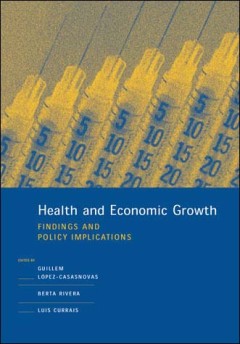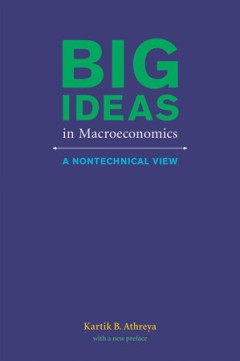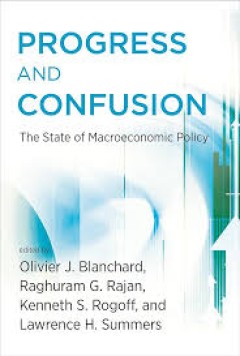Filter by

Health and economic growth : findings and policy implications
While human capital is a clear determinant of economic growth, only recently has health's role in this process become a focus of serious academic inquiry. By marrying the separate fields of health economics and growth theory, this groundbreaking book explores the explicit mechanisms by which a population's individual and collective health status affects a nation's economic development and perfo…
- Edition
- -
- ISBN/ISSN
- 9780262290586
- Collation
- 1 online resource (x, 385 pages) : illustrations
- Series Title
- -
- Call Number
- 330 HEA

Big ideas in macroeconomics :a nontechnical view
Macroeconomists have been caricatured either as credulous savants in love with the beauty of their mathematical models or as free-market fundamentalists who admit no doubt as to the market's wisdom. In this book, Kartik Athreya draws a truer picture, offering a nontechnical description of prominent ideas and models in macroeconomics, arguing for their value as interpretive tools as well as thei…
- Edition
- -
- ISBN/ISSN
- 9780262314404
- Collation
- 1 online resource (xi, 415 pages) :illustrations
- Series Title
- -
- Call Number
- -

What Have We Learned?: Macroeconomic Policy after the Crisis
Since 2008, economic policymakers and researchers have occupied a brave new economic world. Previous consensuses have been upended, former assumptions have been cast into doubt, and new approaches have yet to stand the test of time. Policymakers have been forced to improvise and researchers to rethink basic theory. George Akerlof, Nobel Laureate and one of this volume's editors, compares the cr…
- Edition
- -
- ISBN/ISSN
- 9780262323444
- Collation
- 1 online resource (vii, 359 pages) :illustrations
- Series Title
- -
- Call Number
- -

Progress and confusion the state of macroeconomic policy
Leading economists consider the shape and future of economic policy: Will it resume the pre-crisis consensus or contend with the post-crisis "new normal"? Have we made progress with addressing the major issues or does confusion remain in today's economic environment? Chapters address topics that range from the measurement of systemic risk to foreign exchange intervention.OCLC-licensed vendor bi…
- Edition
- -
- ISBN/ISSN
- 9780262333450
- Collation
- 1 online resource (vii, 304 pages) :illustrations
- Series Title
- -
- Call Number
- -

Karl Brunner and monetarism
"A collection of essays addressing Karl Brunner's contributions to monetarism, and the significance of monetarism to modern macroeconomics"--OCLC-licensed vendor bibliographic record.
- Edition
- -
- ISBN/ISSN
- 0262369672
- Collation
- 1 online resource.
- Series Title
- -
- Call Number
- -

Monetary policy and macroprudential regulation with financial frictions
"A monograph that accounts for financial frictions in some of the most-used macroeconomic models. An attempt to bring practical reality into macroeconomic theory"--OCLC-licensed vendor bibliographic record.
- Edition
- -
- ISBN/ISSN
- 026235943X
- Collation
- 1 online resource.
- Series Title
- -
- Call Number
- -

Macroeconomics
"Macroeconomics is the study of the economic attributes (including the performance, structure, behavior, and decision-making) of whole systems. Macroeconomists study changes in the aggregate, collecting data on unemployment, growth, inflation, income, saving and spending, trade, and other aspects of regional, national, and international economic life. Policymakers depend on macroeconomists' kno…
- Edition
- -
- ISBN/ISSN
- 9780262357913
- Collation
- 1 online resource.
- Series Title
- -
- Call Number
- -

Evolution or revolution :rethinking macroeconomics after the Great recession
Leading economists discuss post--financial crisis policy dilemmas, including the dangers of complacency in a period of relative stability. The Great Depression led to the Keynesian revolution and dramatic shifts in macroeconomic theory and macroeconomic policy. Similarly, the stagflation of the 1970s led to the adoption of the natural rate hypothesis and to a major reassessment of the role of m…
- Edition
- -
- ISBN/ISSN
- 9780262351270
- Collation
- 1 online resource (392 pages).
- Series Title
- -
- Call Number
- -

NBER macroeconomics annual
This 20th edition of the NBER Macroeconomics Annual treats many questions at the cutting edge of macroeconomics that are central to current policy debates. The papers and discussions include an analysis of the differential between American and European unemployment rates, with the authors of the paper taking issue with Edward Prescott's view that higher European tax rates are responsible; a pro…
- Edition
- -
- ISBN/ISSN
- 9780262273732
- Collation
- 1 online resource (xviii, 459 pages) :illustrations, charts.
- Series Title
- -
- Call Number
- -
 Computer Science, Information & General Works
Computer Science, Information & General Works  Philosophy & Psychology
Philosophy & Psychology  Religion
Religion  Social Sciences
Social Sciences  Language
Language  Pure Science
Pure Science  Applied Sciences
Applied Sciences  Art & Recreation
Art & Recreation  Literature
Literature  History & Geography
History & Geography